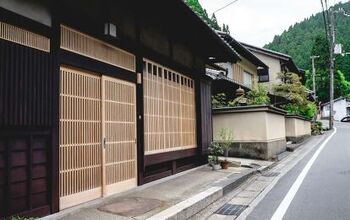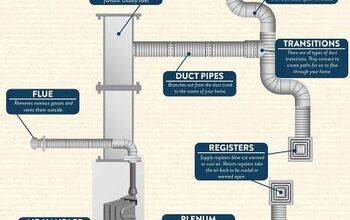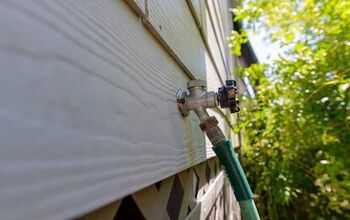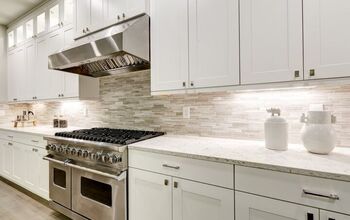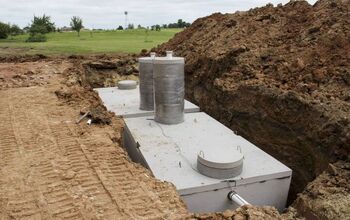Radiant Floor Heating Water Heater Vs. Boiler: A Real Comparison

Some people swear by Water Heaters as a cheaper alternative to Boilers for radiant floor heating. Like most topics in home improvement – both options have their merits.
Boilers use a closed circuit system that converts water into steam for heating. They then distribute the steam throughout the home as a heating solution, including in radiant flooring. Boilers do not work with potable water for the most part. They are a better long term solution, but have a higher upfront cost.
Water Heaters heat potable (drinkable) water. With some extra work, they can be adapted to work with radiant flooring successfully. They can even save you money on your energy bill compared to boilers for radiant flooring. Unfortunately, It is not legal to use a water heater for space heating in cities like NYC, Chicago, or LA.
If you’re a do it yourselfer and don’t mind regular maintenance and replacing your unit every 5-7 years, the water heater might be for you. If you don’t mind trading higher upfront cost for longevity, a boiler system is the better investment.
We recommend discussing your options with a qualified heating engineer before deciding.
Do You Need a Heating and Cooling Contractor?
Get free, zero-commitment quotes from pro contractors near you.

What’s The Difference?
While the basic design of the two appliances are similar, they serve different purposes. An excellent rule of thumb in telling them apart is this:
- Water Heaters connect to potable water systems.
- Boilers operate on closed-circuit systems where the water is separate from the drinkable water supply.
There are some combination models on both sides of the aisle, but this general rule is still the easiest to follow. When looking at a Water Heater versus a Boiler in radiant flooring, there is one VERY important rule: The radiant floor heating system must be on a DIFFERENT circuit than your potable water.
During the summer when not in use, the water in the pipes can grow stagnant and toxic. If this gets into the drinking water, it can cause serious illness. If using a water heater, you will need to install new piping and use external components to help set this up.
Water Heaters
Water heaters are designed to heat and output potable (drinkable) water. They hook up to home water systems and output hot water for everything from dishes to showers. Water heaters come in both storage tank and tankless varieties.
Tankless Water Heaters
It’s usually wiser to stay away from the tankless variety for this purpose. It’s not that it’s impossible to use them in this way. They are more complex to work with, and unless you have a heating engineer on board working with you – the risks outweigh their benefits.
Storage Tank Water Heaters
If you stick to natural gas storage tank water heaters for your radiant flooring, it can work out cheaper than using a boiler. Electric Water Heaters, while efficient in their own ways, are not good for this purpose.
The normal temperature used for radiant floor heating is between 90 and 140 degrees fahrenheit. This is easily within a water heater’s power. Once the floor is heated, it takes a minimal amount of energy to keep all the water at the same temperature – leading to reduced energy costs.
The downside to Water Heaters as a radiant floor heating solution is this lies outside of their intended use. Most warranties don’t cover it. The constant use also wears down their components faster and the water heater will need to replacing every 5-7 years.
Efficiency & Cost
Water heater manufacturers assume that these appliances will see use every day, but not constant use. Under normal conditions, the efficiency rating is assuming that heat will be lost from the storage tank when it is not in use.
When used as a radiant floor heating solution, the water must be kept in a closed loop separate from the drinking water in the home. This means that water returning from the heated floor is pumped back into the top of the tank, and the water heater has to do less work to heat it back up.
They are much cheaper in price as well, starting at just over $300 for a 40 gallon tank. At this price, it can be worth it replacing it every 5 years if you don’t mind the work. Water Heaters are a decent solution for radiant flooring, and can be a valid option – so long as you isolate them from your potable water system.
Boilers
Boilers are a common and energy-efficient home warming solution. Unlike water heaters, boilers are designed on a closed-loop model that doesn’t release the water. They heat it and turn it into steam. The steam runs through pipes throughout the house leading to radiators, and can be used in a radiant floor heating solution. As it begins to cool, it returns to the boiler.
Boilers are much pricier than Water Heaters though, and can be more complex to install depending on your setup. But with regular maintenance they can last upwards of 20 years. Their warranties cover usage in home heating solutions – meaning you’re covered if manufacturing defects pop up after installation.
Efficiency & Cost
These units are better as a long-term solution than water heaters. And, because they are designed for use with radiant flooring – the warranty covers you. There are a few varieties, but the overall design is always the same. Boilers use a closed-circuit design to heat the home – heating water as it passes through the boiler and either storing it in a tank or working on demand.
The major downside of boilers is the price and installation. They cost a lot more than your conventional water heater, starting at around $2,000 for a low end model – before installation. They are a little more complex to install than water heaters. Still, to take advantage of their warranties you will need a certified professional to install it.
In return though, boilers offer a long-lasting appliance. There are boilers that will last upwards of 15 years when purchased from a reputable manufacturer. Always check the warranty paperwork before you make your decision – a strong warranty usually means a strong product.
Do You Need a Heating and Cooling Contractor?
Get free, zero-commitment quotes from pro contractors near you.

Our Final Take
When deciding on a water heater or boiler for your radiant floor heating needs, there are a few important factors to weigh. If cost is your primary concern, a water heater offers a cheap and effective solution without breaking the bank.
Some areas forbid this in their local building code, so always be sure to check with your city before installation. Using a water heater in this way may also void the warranty, but that won’t bother some DIYers.
A boiler is the better choice if you’re looking for longevity. They can last 15 years or more when installed by a certified professional and maintained well. Boilers are a tried-and-true method that is guaranteed by warranty. And they provide heating throughout the entire household, not just in floor.
Just remember – always consult with a certified professional before making your decision. Every home and heating solution is different, and what works in one case may not work in yours.
Related Guides

We are a team of passionate homeowners, home improvement pros, and DIY enthusiasts who enjoy sharing home improvement, housekeeping, decorating, and more with other homeowners! Whether you're looking for a step-by-step guide on fixing an appliance or the cost of installing a fence, we've here to help.
More by Upgraded Home Team



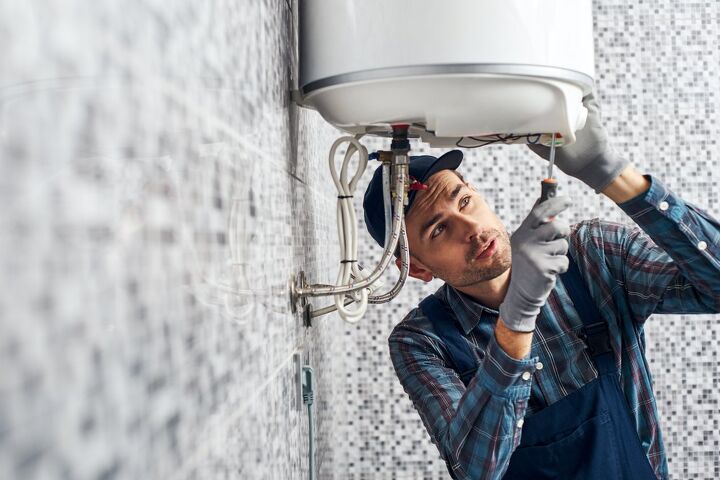






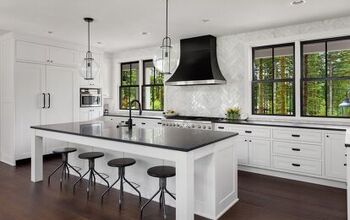


![Finishing Basement Without Permit [Is It Really Illegal?]](https://cdn-fastly.upgradedhome.com/media/2023/07/31/9070078/finishing-basement-without-permit-is-it-really-illegal.jpg?size=350x220)

